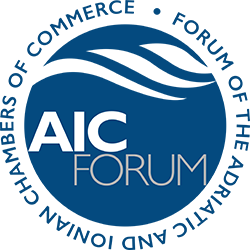The Adriatic and Ionian Fora of Chambers of commerce, Universities and Cities and their members, in cooperation with Adriatic and Ionian Initiative – Chairmanship of the Republic of Slovenia organized three online Side-Events that were held on 27 and 29 of January within the framework of the V EUSAIR Forum. The webinars analyzed and discussed the impact of Covid-19 on three main topics: crisis management and marketing communication, women’s entrepreneurship, innovation and robotics for the preservation of natural resources.
The Webinar “Crisis management and marketing communication during Covid-19″ Focus on Bosnia-Herzegovina and Albania, which was held on January 27 at 9am, was organized in cooperation with Chamber of Economy of Federation of Bosnia-Herzegovina and Chamber of Durres, designed to present and discuss challenges and possible solutions and focused on the economic sector in Albania and Bosnia-Herzegovina through presentations by University professors, examples from private sector practice, reviews of the government sector and best practices of project developers.
The Covid-19 pandemic poses an unprecedented challenge. While we do not yet know its full impact, it is set to change the future of work, economy, governance, and health and severely affects all areas of development. The event focused on effective solutions to Covid-19 pandemic in the intersection between connectivity, digital innovation, and novel social policies.
Moderating the debate Danijela Lovrić (Chamber of Economy of the Federation of Bosnia and Herzegovina).
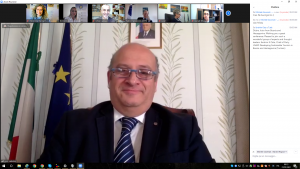
The meeting opened with greetings from the President of the Marche Chamber of Commerce and of the Forum of the Adriatic and Ionian Chambers of Commerce, Gino Sabatini, who greeted all the participants to the first of the three Side-Events organized by the Forum with AII and the Slovenian Presidency. “The aim of the Forum, during this very special period is to empower the synergy and opportunity for social-economic development of the Adriatic and Ionian Area through innovation and digitization in order to achieve better coordination and share best practices. Today we will focus on Bosnia-Herzegovina and Albania and how they are facing these difficulties and challenges. I look forward to a productive and fruitful discussion today. Buon lavoro a tutti!”.
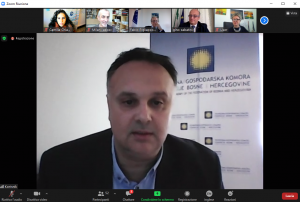
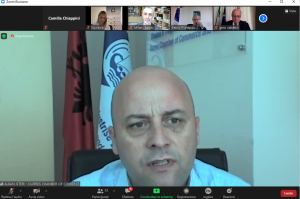
Marko Šantić (President, Chamber of Economy of the Federation of Bosnia and Herzegovina) expressed his gratitude to those who are constantly working in order to overcome these hard times , Alban Isteri (President, Durres Chamber of Commerce and Industry) then stressed the importance of Chambers of commerce and industry which are an important partner for all business and carry out important functions, making them one of the most important institutions for the development of private enterprises system and the economy of their territory of action. The Covid pandemic has changed our lifestyle and has put us up against a big challenge for the future. This webinar is a chance to give everyone a concrete opportunity to discuss about the outcomes of the crisis and will give to all the attendees real examples of best practices and new innovative ideas to win this battle.
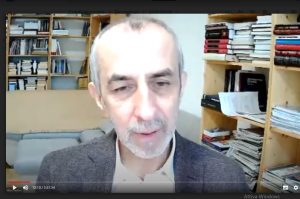 The ambassador Milan Jazbec (AII Chairman-in-office, Ministry of Foreign Affairs of the Republic of Slovenia) declared himself to be very honored to take part in the event on behalf of the Slovenian presidency of the AII. He also underlined the importance of the occasion that unites all the three Fora of Civil Society and that brings to the light a subject so challenging for governments, which have the responsibility to prevent the spread of the virus. That is why communication during this hard times is so essential: governments have to be trustworthy. This is a test for all countries in the EU; it is a veritable opportunity to learn and advance. He then wished all the participants a fruitful event and affirmed that it will be interesting to include all the results coming up form the webinar into the future actions of the Slovenian presidency.
The ambassador Milan Jazbec (AII Chairman-in-office, Ministry of Foreign Affairs of the Republic of Slovenia) declared himself to be very honored to take part in the event on behalf of the Slovenian presidency of the AII. He also underlined the importance of the occasion that unites all the three Fora of Civil Society and that brings to the light a subject so challenging for governments, which have the responsibility to prevent the spread of the virus. That is why communication during this hard times is so essential: governments have to be trustworthy. This is a test for all countries in the EU; it is a veritable opportunity to learn and advance. He then wished all the participants a fruitful event and affirmed that it will be interesting to include all the results coming up form the webinar into the future actions of the Slovenian presidency.
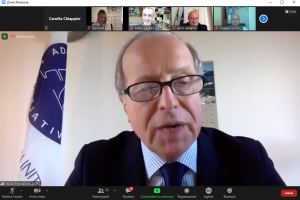
The ambassador Fabio Pigliapoco (Adriatic Ionian Initiative Permanent Secretariat) then affirmed that the AII Secretariat is by the Fora’s side, to support their initiatives. He underlined that the Fora are in fact the heart of the EUSAIR Strategy and their work is precious. That is why AII is happy to include these events in the framework of the V EUSAIR FORUM.
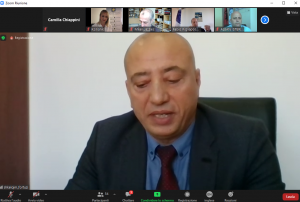 The first part of the Webinar focused on Crisis Management and Communication; The meeting was opened by Shkelqim Fortuzi (University “Aleksander Moisiu“ Durres, Albania) who presented the current status of the activity of the University, which is totally operating online, with a positive response from the side of the students. The most afflicted sector in Durres is the Tourism, which also represents the main source of income of the region. There has been a drop in the number of tourists, causing many businesses to shut down and the unemployment rate to grow very fast. He takes also the opportunity to announce the Conference of the Business Faculty, taking place the next 27th of May at the university of Durres.
The first part of the Webinar focused on Crisis Management and Communication; The meeting was opened by Shkelqim Fortuzi (University “Aleksander Moisiu“ Durres, Albania) who presented the current status of the activity of the University, which is totally operating online, with a positive response from the side of the students. The most afflicted sector in Durres is the Tourism, which also represents the main source of income of the region. There has been a drop in the number of tourists, causing many businesses to shut down and the unemployment rate to grow very fast. He takes also the opportunity to announce the Conference of the Business Faculty, taking place the next 27th of May at the university of Durres.
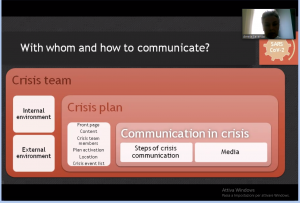 Arnela Bevanda (University in Mostar) offered participants a general overview on how different the way of communicating of a company can be: Scientific approach (communicate now and say it all), legal approach (speak as little as possible) and practical (silence is gold!). For a company is now important to take control of the messages sent on the outside: this is not time for silence and the messages need to be short and simple in order to be comprehensible.
Arnela Bevanda (University in Mostar) offered participants a general overview on how different the way of communicating of a company can be: Scientific approach (communicate now and say it all), legal approach (speak as little as possible) and practical (silence is gold!). For a company is now important to take control of the messages sent on the outside: this is not time for silence and the messages need to be short and simple in order to be comprehensible.
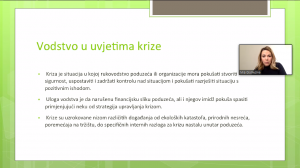 Mia Glamuzina (Logos centar, College Mostar) then added that crisis has different definitions and can be classified as “manageable” and “non manageable”. The Covid-19 pandemic is to be inserted in the second type of this classification; it is out of the control of companies and governments and it obviously makes it hard to respond and to send correct messages on the outside. While there are many strategies that can be put in place such as denial or blaming others, the best way to handle it is to show interest in the critic situation as soon as possible.
Mia Glamuzina (Logos centar, College Mostar) then added that crisis has different definitions and can be classified as “manageable” and “non manageable”. The Covid-19 pandemic is to be inserted in the second type of this classification; it is out of the control of companies and governments and it obviously makes it hard to respond and to send correct messages on the outside. While there are many strategies that can be put in place such as denial or blaming others, the best way to handle it is to show interest in the critic situation as soon as possible.
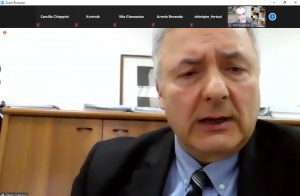 The second session of the webinar was dedicated to Government measures in Terms of COVID-19 And the view from the perspective of FBIH Employers: Zlatan Vujanović (Minister Federal Ministry of Trade) described the response of the FBIH government to the crisis which hit in March and was approached immediately as a “natural disaster”. The government enacted a law in May, under the name of “Corona Law” which enhanced help to citizens and companies. The aim was to help the sectors that were suffering the most and prevent job losses. He affirmed that the government will continue to apply the principles of the Corona Law also during 2021, because it proved itself to be a valid intervention. He once again confirmed the idea that it is very hard to do well in the interest of the citizens, but what they certainly did was to act immediately recognizing the Pandemic as a criticism.
The second session of the webinar was dedicated to Government measures in Terms of COVID-19 And the view from the perspective of FBIH Employers: Zlatan Vujanović (Minister Federal Ministry of Trade) described the response of the FBIH government to the crisis which hit in March and was approached immediately as a “natural disaster”. The government enacted a law in May, under the name of “Corona Law” which enhanced help to citizens and companies. The aim was to help the sectors that were suffering the most and prevent job losses. He affirmed that the government will continue to apply the principles of the Corona Law also during 2021, because it proved itself to be a valid intervention. He once again confirmed the idea that it is very hard to do well in the interest of the citizens, but what they certainly did was to act immediately recognizing the Pandemic as a criticism.
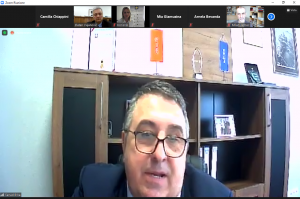 Mr. Senad Brka (Association of employers of FBIH) took the floor, and confirmed the steps of the government in Bosnia-Herzegovina already cited by the ministry. He stressed the fact that all governments couldn’t be ready for such an event, but good communication has been put in place in order to respond to the crisis.
Mr. Senad Brka (Association of employers of FBIH) took the floor, and confirmed the steps of the government in Bosnia-Herzegovina already cited by the ministry. He stressed the fact that all governments couldn’t be ready for such an event, but good communication has been put in place in order to respond to the crisis.
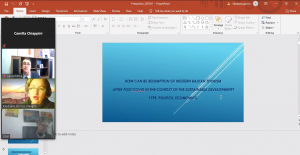 The third session, dedicated to COVID-19 Impact on Tourism sector, opened with Klodiana Gorica (Tourism Association Durres, Albania) who affirmed that Tourism is an economic powerhouse with a high potential to contribute, directly and indirectly, to the global economy of the country. She talked about sustainability in tourism as “optimal use of environmental resources”, and of social inclusion to face post-Covid situation. A key concept is Blue Economy in Albania, which will help to promote development of the marine economic ecosystem, attract investments and boost the internationalization of Albanian coasts. She finally stressed the importance of innovation and connection and the necessity to put in place new strategies and best practices.
The third session, dedicated to COVID-19 Impact on Tourism sector, opened with Klodiana Gorica (Tourism Association Durres, Albania) who affirmed that Tourism is an economic powerhouse with a high potential to contribute, directly and indirectly, to the global economy of the country. She talked about sustainability in tourism as “optimal use of environmental resources”, and of social inclusion to face post-Covid situation. A key concept is Blue Economy in Albania, which will help to promote development of the marine economic ecosystem, attract investments and boost the internationalization of Albanian coasts. She finally stressed the importance of innovation and connection and the necessity to put in place new strategies and best practices.
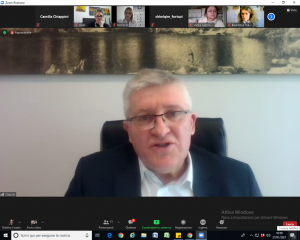 Stjepan Primorac (Association of Tourism FBIH) intervened pointing out that the problem was not only in the tourism and hospitality sector, but in all other branches of the economy related to tourism, that felt the consequences of the pandemic. The business decline was 70%, and a large number of suppliers are endangered. However, at the same time, thanks to our Chamber, we sent out a number of initiatives, ideas, proposals to the federal government: a set of compensatory measures that were supposed to mitigate the effects of the pandemic. It is strongly advisable for those measures to continue to be in place as long as the pandemic crisis lasts, and we do not know how long it will last.
Stjepan Primorac (Association of Tourism FBIH) intervened pointing out that the problem was not only in the tourism and hospitality sector, but in all other branches of the economy related to tourism, that felt the consequences of the pandemic. The business decline was 70%, and a large number of suppliers are endangered. However, at the same time, thanks to our Chamber, we sent out a number of initiatives, ideas, proposals to the federal government: a set of compensatory measures that were supposed to mitigate the effects of the pandemic. It is strongly advisable for those measures to continue to be in place as long as the pandemic crisis lasts, and we do not know how long it will last.
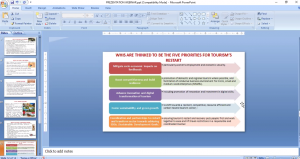 And lastly, Flora Merko (University “Aleksander Moisiu“ Durres, Albania), made a point on the impact of the pandemic on the tourism sector: Albania is still suffering for a large number of Covid cases and therefore the tourism sector highly resents of the impossibility to host tourists and foreigners. She gave five priorities for tourism’s restart: mitigate socio-economic impacts on livelihoods; boost competitiveness and build resilience; advance innovation and digital transformation in tourism; foster sustainability and green growth; coordination and partnerships to restart and transform the sector.
And lastly, Flora Merko (University “Aleksander Moisiu“ Durres, Albania), made a point on the impact of the pandemic on the tourism sector: Albania is still suffering for a large number of Covid cases and therefore the tourism sector highly resents of the impossibility to host tourists and foreigners. She gave five priorities for tourism’s restart: mitigate socio-economic impacts on livelihoods; boost competitiveness and build resilience; advance innovation and digital transformation in tourism; foster sustainability and green growth; coordination and partnerships to restart and transform the sector.
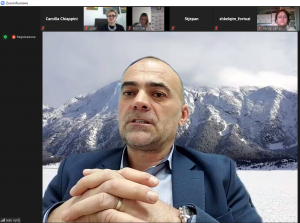 The fourth and last session of the webinar was devoted to Best practices and challenges for the next period, Ivan Jurilj (EU Integration office ZHŽ) affirmed that Covid had a serious impact on the public sector; since everything was blocked, it was necessary to invest into communication, especially Digital Technology, with the support of the European Union. In 2020, he said, it has been a necessity to start digitalize the education sector, in order to make it the most efficient possible. A great work has also been done on the agricultural sector, with a plan on Rural Tourism. Jurilj pointed out that nobody can tell with certainty what the future holds, but what we can do is to be focused on the events and, if necessary, make eventual modifications to our actions and responses.
The fourth and last session of the webinar was devoted to Best practices and challenges for the next period, Ivan Jurilj (EU Integration office ZHŽ) affirmed that Covid had a serious impact on the public sector; since everything was blocked, it was necessary to invest into communication, especially Digital Technology, with the support of the European Union. In 2020, he said, it has been a necessity to start digitalize the education sector, in order to make it the most efficient possible. A great work has also been done on the agricultural sector, with a plan on Rural Tourism. Jurilj pointed out that nobody can tell with certainty what the future holds, but what we can do is to be focused on the events and, if necessary, make eventual modifications to our actions and responses.
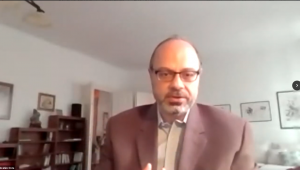 Ibrahim Osta (USAID Developing sustainable Tourism in Bosnia and Herzegovina) then presented the USAID 5 years long project, named “Turizam”, to boost the tourism sector in Bosnia- Herzegovina. The goal of the project is sustainability to start growing again once the pandemic will be over. The numbers of tourists and the income of the sector went down of 70 to 100%, due to the pandemic, but studies have shown a massive research on the web for travels: people are looking, and the aim of the project is to make them move from looking to booking. In order to do so, there is the necessity to build campaigns that will inspire trust and attract tourists. Bosnia-Herzegovina created a “Safe Travels” label, that certified that they are comply to safe protocols and high standards. However future is uncertain and there is still much to be done.
Ibrahim Osta (USAID Developing sustainable Tourism in Bosnia and Herzegovina) then presented the USAID 5 years long project, named “Turizam”, to boost the tourism sector in Bosnia- Herzegovina. The goal of the project is sustainability to start growing again once the pandemic will be over. The numbers of tourists and the income of the sector went down of 70 to 100%, due to the pandemic, but studies have shown a massive research on the web for travels: people are looking, and the aim of the project is to make them move from looking to booking. In order to do so, there is the necessity to build campaigns that will inspire trust and attract tourists. Bosnia-Herzegovina created a “Safe Travels” label, that certified that they are comply to safe protocols and high standards. However future is uncertain and there is still much to be done.
The debate will continue in the group that will be created within the Stakeholder Platform, in which the presentations of the speakers and the recording of the event will be uploaded.
Here you can find the Recording of the entire EVENT and the presentations of the speakers:
